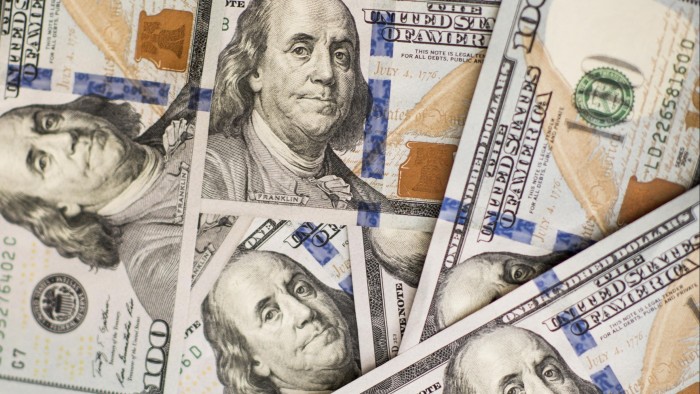Unlock the Editor’s Digest for free
Roula Khalaf, Editor of the FT, selects her favourite stories in this weekly newsletter.
The writer is president and chief investment strategist at Yardeni Research
When the US stock market was hitting new record highs last year, led by the Magnificent Seven group of technology companies, the financial media and many investors extolled “American exceptionalism”. Now, not so much.
Instead, the widespread worry is that the US is in decline as the world’s pre-eminent economic and military power. In this scenario, the exceptionalism has been fuelled with excessively high federal government deficits that have resulted in a debt-to-GDP ratio exceeding 120 per cent, a fourfold increase since 1980. The net interest outlay on all this debt is tracking at an annual rate of $1tn.
America depends more than ever on foreign investors and central banks to finance the government’s deficit and to refinance its maturing debt. However, in the first 100 days of his second term in the White House, President Donald Trump has abruptly turned the US towards policies widely viewed as protectionist and isolationist. As a result, foreign investors are reconsidering their commitment to its capital markets. In addition, they are questioning whether the Treasury bond market and the dollar are losing their status as havens in a volatile world.
So the decline of the dollar this year has been viewed as confirmation that Trump’s “new world disorder” will harm America’s pre-eminence. It may also be a harbinger of a US debt crisis if foreigners lose their confidence in the country.
This is all a very depressing narrative. It may also be an absurdly alarmist view that’s simply an overreaction to the recent correction in the S&P 500. The sell-off was certainly attributable to Trump’s tariff turmoil. But, now with the benefit of hindsight, everyone agrees that stock valuations were stretched at the start of this year, especially for the Magnificent Seven. In other words, the stock market was cruising for a bruising. Lots of the recent pain experienced by the tech giants came as investors questioned their high spending on artificial intelligence infrastructure.
The angst mounted quickly when the US 10-year Treasury bond yield spiked from 4.00 to 4.50 per cent in a couple of days in early April after Trump introduced his tariff regime on “liberation day”, as he dubbed it. The rise in bond yields spooked the Trump administration, leading the president to postpone the tariff increases.
At the same time that stock and bond prices were falling, the widely followed Dollar Index (DXY) fell rapidly by almost 10 per cent. America was no longer exceptional, according to the doomsayers. Then again, financial markets can be volatile without confirming that the end is near for American exceptionalism. Recent events can be explained quite simply and without implying any dire consequences. Consider the following:
• Since early last year, DXY has been highly correlated with the price of the Roundhill Magnificent Seven ETF. US Treasury data shows that foreign investors piled into US stocks at a record pace last year. When open-source DeepSeek R1 was launched on January 20 this year, investors lost their confidence in companies that had been spending a lot on AI infrastructure, including the Mag-7. DXY fell as global investors sold them and allocated more of their portfolios to Chinese and European stocks.
• DXY is an odd duck. It isn’t a trade-weighted dollar index, as widely assumed. It is based on a basket of six major foreign currencies — but their weights don’t change. It is mostly driven by the euro, which has a 57.6 per cent weight.
• On a weekly basis, the Federal Reserve board releases daily measures of a “broad” trade-weighted dollar index. DXY is usually highly correlated with the Fed’s dollar index relative to advanced foreign economies. But on a year-to-date basis, DXY is down 8.3 per cent, while the Fed’s broad index is down 4.8 per cent.
This all suggests this is at least in part a dollar-euro story, as US stocks are sold to buy European ones.
It’s true that the US government has issued a record amount of debt. That makes the US Treasury market the largest, most liquid, and (still) the safest capital market in the world. The dollar should remain the pre-eminent reserve currency. Global investors might soon start buying the Magnificent Seven again now that Alphabet, Meta and Microsoft reported great earnings for the first quarter of 2025. If so, that should boost DXY.




